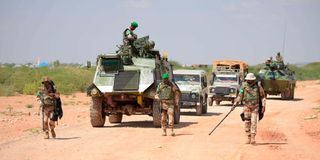Somalia seeks three-month delay in AU force drawdown

African Union Transition Mission in Somalia (ATMIS) troops during a routine drill in Beletweyne, Somalia on November 23, 2022.
Somalia has formally requested the United Nations Security Council (UNSC) to pause the planned drawdown of the African Mission Transition Mission in Somalia (ATMIS) troops by three months, citing Somali National Army's unpreparedness to take charge of the security situation at the moment.
Though the government maintains its commitment to the December 24 complete drawdown of ATMIS troops, it warns that a rushed drawdown in phase 2 risks jeopardising the stability and security of Somalia.
“The Federal Government of Somalia formally requests a technical pause in the drawdown of the 3,000 African Union Transition Mission in Somalia (ATMIS) uniformed personnel by 3 months, as outlined in UN Security Council Resolution 2687 [2023],” the formal request by President Hassan Sheikh Mohamud’ssecurity advisor Hussein Sheikh Ali notes.
The first phase saw 2,000 troops exit Somalia by June 30 this year when six military bases were handed over to the Somali Security Forces in line with United Nations Security Council Resolutions.
The second phase was scheduled to end this month where an extra 3,000 were scheduled to exit Somalia ahead of the complete withdrawal by December next year.
On Sunday, Bio Cadale Forward Operating Base (FOB) in the HirShabelle State Was handed to Somali forces by the Burundi National Defence Forces (BNDF), kicking off the second phase.
Located in the Middle Shabelle region, the base is strategic as it is a buffer zone to Jowhar town, the administrative headquarters of the HirShabelle State.
Citing a Joint Technical Assessment (JTA) report that revealed the complications that are likely to follow the planned drawdown terming them as profound, Somalia now says it wants a comprehensive security plan be established on how populations around FOBs located in remote areas are secured after their collapse or handing over to Somalia’s security agencies in order to ensure a seamless transition as witnessed in phase one of the drawdown.
“The Joint Technical Assessment report, a collaborative endeavour between the Federal Government of Somalia and ATMIS, mandated under Part VI, paragraph 40 of UN Security Council Resolution 2687 [2023], provides a comprehensive evaluation of the present state of security transition in Somalia. It provides us with invaluable insights into the key challenges that warrant meticulous consideration before proceeding with the drawdown of ATMIS uniformed personnel,” the letter adds.
Somalia says the technical pause will provide the government with the indispensable time required to collectively devise solutions to the challenges elucidated in the JTA report, ultimately guaranteeing a more seamless and secure security transition.
“We hold firm that this technical pause will, in the long run, contribute to the enduring peace, stability, and prosperity of Somalia.”
During the three-month period, the Somali forces will get a period of respite for recuperation from its ongoing offensive operation against the al-Shabaab militants.
Somalia is on a wide-scale offensive against terror group al-Shabaab that the government says has stretched its military forces thin necessitating a reorganisation that ensures continuity of the operation.
“Therefore, the proposed 90-day suspension of the drawdown of our forces will prove invaluable in achieving these objectives...The relative success in Phase 1 locations can be attributed, in part, to the proximity of ATMIS contingents and Troop Contributing Countries (TCCs) near the FOBs, possibly serving as deterrents. However, this dynamic may not be replicable in the more remote areas encompassed by Phase 2, where there is an absence of latent ATMIS or allied-forces threat.”
In the letter, the government pledges to sustain its cooperation and coordination with ATMIS troops assuring that the circumstances leading up to the impending drawdown in June 2024 will significantly differ from the current situation.
“At that juncture, the realities on the ground will be notably enhanced and well-prepared, enabling the Somali Security Forces to adeptly oversee the security transition.
Somalia has been facing attacks on bases handed to it by ATMIS troops in recent weeks the latest being the former Gherille Forward Operating Base that was handed over to Somali forces by the Kenya Defence Forces in July, but was attacked a few days later.





